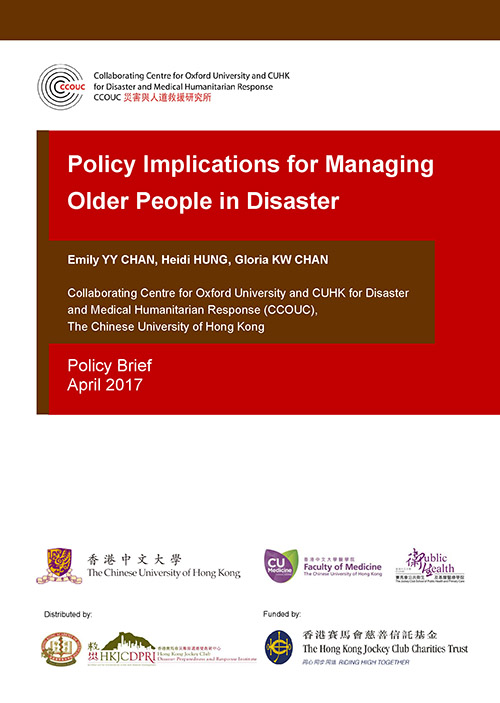You are here
Policy Brief - Policy Implications for Managing Older People in Disaster
Policy Brief - Policy Implications for Managing Older People in Disaster
Between 2005 and 2014, disasters have caused total damage of US$1.4 trillion worldwide, with 1.7 billion people affected and 0.7 million killed. With climate change, urbanization, environmental degradation and poverty, the world has been experiencing disasters at a higher frequency and intensity. At the same time, global population is ageing at an unprecedented speed: between 2015 and 2030, the number of persons aged 60 years or over in the world is projected to grow by 56%, from 901 million to more than 1.4 billion. Older people therefore is going to be an increasingly important group, in terms of both their contribution and vulnerabilities, in the face of disasters. This paper discusses the disaster-related health risks of the older people in Hong Kong, and presents key policy recommendations for better protection of this vulnerable group.
It is worth noting that several key messages have been highlighted in the paper, such as ageing population is an important factor affecting effectiveness of disaster management, and healthy ageing is a crucial disaster risk reduction strategy; older people face specific vulnerability in physical, mental and social well-being in disasters. They are likely to experience socio-economic marginalization, isolation, inaccessible information and lack of relevant post emergency support services during disasters; older people may significantly contribute to disaster preparedness, response and recovery; but their capacities are often under-utilized; There is no specific recognition of the roles and the needs of older people in disaster planning and response in Hong Kong. Policy actions to mainstream the disaster-related health needs of the older people and to enable them to contribute are recommended.
The full version of this policy brief can be downloaded in this page. If you have any thoughts about this policy brief, you can enter our discussion platform to initiate or participate in the discussion. If you have not registered in our e-learning platform before, please click here to create a new account.




